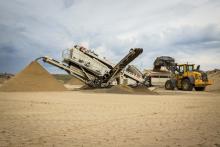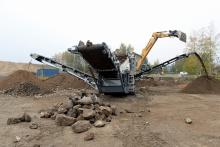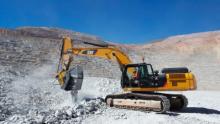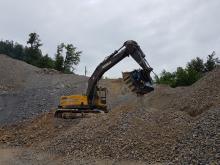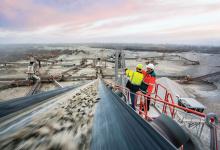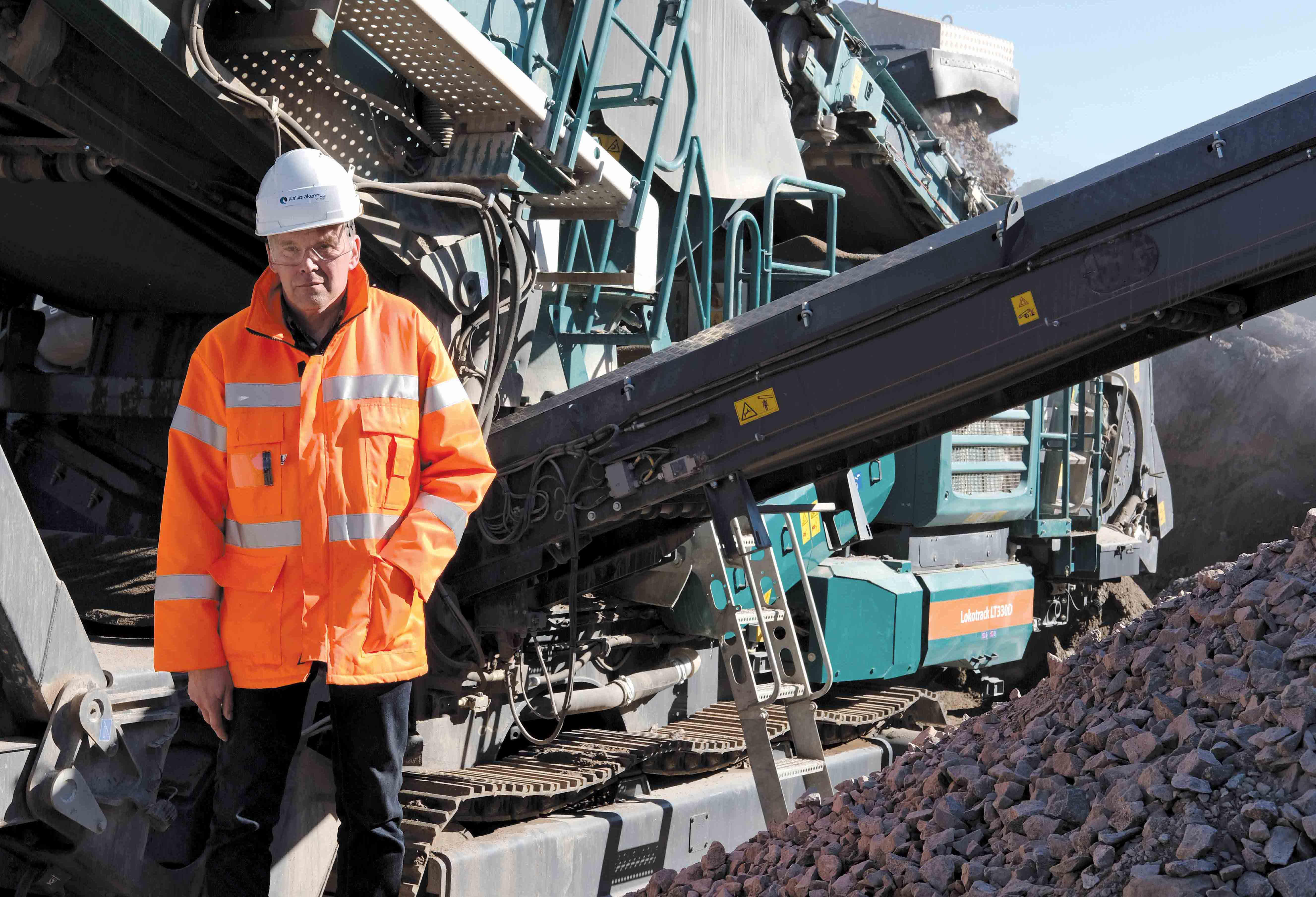
A Finnish aggregates processing plant is going to admirable lengths to minimise its environmental impact, while a number of quarry operators are targeting productivity and efficiency gains from their crushing and screening model fleets. Guy Woodford reports.
Kalliorakennus has recently started using two
The new Metso models are, among other tasks, producing 200,000tonnes/year of granite products for concrete which are being used to build a key 2km underground tunnel between Kivenlahti and Espoonlahti stations as part of the ongoing 13.5km Länsimetro (the Helsinki Western Metro Extension) project. Earmarked for completion in 2020, the extended metro will run from central Helsinki to Espoo.
Regarding its investment in electric models, Kalliorakennus’s production manager at the Espoo site, Jukka Vaisanen, says: “We want to be good for the environment by generating less noise and dust. As a company we always think about lowering our carbon footprint and I’m very pleased the owners have invested in these new Metso models. It’s also hard to get working permits when you operate near residential areas and operating emission-free, full electric crushing and screening models helps obtain them. Running electric models also helps lower our overall fuel costs, which we are looking to reduce by 20%. The electric models also require less servicing.”
For the Helsinki metro extension project, Kalliorakennus Espoo is processing granite rock drilled and blasted at the tunnel work site 15kms away. The material is transported by on-road trucks running to and from the processing plant.
Operational 10 hours a day, Monday to Friday, Väisänen says the Kalliorakennus Espoo processing plant has its noise and dust levels constantly monitored, with some of its new Metso crushing and screening models soon to be involved in a cold weather dust suppression research project involving Metso, VTT Technical Research Centre and the University of Tampere.
“The project is testing a crushing and screening dust suppression system we have developed that heats up, allowing you to still use a water spray in up to minus 30 degree temperatures,” explains Mikko Takaniemi, Metso’s Helsinki area sales manager. “We tested it last winter and it’s going to be field-tested at Kalliorakennus Espoo this winter.
“Finnish crushing and screening customers are very aware of environmental issues and want to set new standards, and Metso is the best [crushing & screening] player in the game on environment and safety and wants to be an even better one.”
In another effort to reduce noise pollution, the new Lokotrack LT330D cone crusher at Kalliorakennus Espoo has been covered with black rubber mats, said to lower its noise levels by at least 5dB.
Meanwhile, at another of its sites, in Vantaa, also near Helsinki, Kalliorakennus operates three Metso units with external electricity - a Lokotrack LT7150E vertical shaft impactor, a Lokotrack ST2.8 mobile screen with bi-power and a Lokotrack ST4.8 mobile screen with bi-power.
In Ireland, Shannon Valley Quarries’ is said to be reaping the rewards from its October 2015 investment in a
Screening rock for dust and products sized 20mm, 14mm and 10mm, the Chieftain 2100X is working 10 hour days, six days a week. O’Neill adds: “We run our machine at a steady 350 tonnes an hour. However we have set the top deck at 45mm and the mid deck at 35mmm, and we were working it at 750 tonnes an hour. The machine did what we asked of it, and more.”
BAG Klöch Aufbereitungstechnik and Staber Holding in Austria have enjoyed a mutually beneficial business relationship for over 20 years. This meant when it came to investing in a new screen to produce aggregates for its diverse customer base, Staber had little hesitation in contacting BAG. Following a highly successful demonstration, a new QE241 mobile scalper from
The Federal Province of Kärnten (Carinthia) in Austria advertises itself with the slogan ‘Lust for life’. This motto has been practised by the Staber family for over 200 years in the upper Carinthian area. Staber Holding, which operates several companies, has been heavily involved in the social and economic development of the region. This is rather apt as the name for Carinthia is derived from the Celtic ‘Karanto’, which leads to the words ‘stone’ and ‘rock’. This succinctly sums up the development of Staber’s business interests when the company moved into ‘Erdbau’, or ‘Earth building’.
A recent project involving the company is the Tauern motorway, which has been supplied materials from Staber’s Drau Valley sand and gravel pit in Pöllan. Lying between the villages of Villach, Spittal, Draun, and Paternion, it became operative in 1998, and now provides high-quality construction materials for the region. Hannes and Michael Staber, joint managing directors, operate the 16 acre site to provide materials for the earthmoving side of the business.
In order to improve business operations, the two brothers realised they required a compact screen, but one with a large screening area. The screen would be used in their own gravel pit, as well as on customer construction sites dealing with excavated materials and, when applicable, for recycling construction materials. As on-site and site-to-site mobility were paramount, the screening plant needed to fit onto one of the company’s trailers, and be easily transportable to customers’ construction sites. In April 2016 Staber settled on a new mobile Sandvik QE241 mobile scalper. This was supplied by Staber’s partner of many years, Sandvik’s dealer in Austria, BAG Klöch Aufbereitungstechnik.
BAG was contacted by Staber, who were visited by BAG’s Christoph Ulrich. After intensive discussions, an on-site demonstration was arranged where the QE241was put to work screening and scalping dolomite and limestone carbonate. Following the highly successful demonstration, the Staber brothers knew that the QE241 was the screen they were looking for, as it had successfully passed the ‘hardness’ test the company had set it.
Sandvik developed the new QE241 based on customer feedback, thereby expanding the product range. Targeted at the European market, it presents the ideal solution for applications where performance, flexibility of use and transportability are combined with quick set-up. The QE241 also benefits from the long history of Sandvik’s mobile scalping developments, and includes the renowned characteristics of the larger models in the series, such as a 2-way split configuration and sequential start-up.
The novel properties of the QE241 include a variable speed feed conveyor and a highly dynamic 3.35 x 1.24m double-deck screen box. The company claims that the QE241 provides the largest screen size in this class, which, when combined with the ‘banana type’ deck, ensures a highly effective and efficient screening solution. Stockpiling is facilitated by its impressive 1,200mm wide conveyor to transport oversize, whilst the two hydraulically folding side conveyors transport the fine and medium sized material.
“We are very pleased to partner with Assolari Group who will bring excellent service to Terex Finlay customers in Northern Italy,” says Nigel Irvine, Terex Finlay’s Sales & Marketing director.
Tamburri said that demand in Europe, mainly central Europe, for quarrying and highways construction and maintenance equipment had increased this year compared to 2015, with most emerging markets, including China, Brazil and Russia, going through more difficult times.
At bauma 2016, Simex unveiled the VSE 20 screening bucket; the redesigned CB 30 and CB 40 crusher buckets for excavators; the WG 40 (wall grinder) for excavators; the RWE 30 and RWE 50 wheel saw for excavator booms; and the redesigned CB 900, CB 1200 and CB 1500 crusher buckets for front loaders.
“The first responses from the markets to our new products seems to be very positive. We sold some of our new crusher buckets to customers who saw them at the exhibition and in the trade press. The sales were mainly to customers in Italy and Germany,” said Tamburri. “They are lighter products with the same crushing force. They also have more loading capacity with less wear.
“Some of our previous crusher bucket customers that have been testing the new redesigned buckets said they liked the changes that we made.”
Tamburri said Simex had seen “notable” growth in the German quarry crushing and screening equipment market. “In other countries, like France, there is more growth on the highways side. We had a very strong first half of 2016 in Sweden due to demand from the cabling jobs,” he added.
Of demand in Simex’s native Italy, Tamburri said: “The Italian market is coming to life again. The government is investing, mainly on the road maintenance side. Saying that, there are still major road repairs jobs that need to go ahead. The biggest product demand in Italy is for cold planers.”
Tamburri said that Simex enjoyed an “incredible boom” in 2015 – with company turnover of €28 million, compared to €24 million in 2014. “This was down to a combination of factors. There were signs of recovery from traditional sales markets and emerging markets were good. Now, the traditional market growth is consolidated, but the emerging markets are down.”
Simex is hoping its established dealership in India can land earthmover attachment orders for what Tamburri describes as “very big” highways projects in what is the world’s second-most populated country.
Of the Middle East market, Tamburri said: “The price of oil has hurt our chances there and there are political factors in countries such as Saudi Arabia. However, we are seeing opportunities in Iraq. There’s also Iran, which has a lot of money to spend. I go there every eight to ten months. I think Iran will be the big emerging market in the coming years.”
Through the CRM’s features, including an independent hydraulic adjustment of the armour, and the steady feed obtained by means of a particular vibrating feeder with restricted oscillation, the impact crusher range is said to be ideal for producing 5mm-250mm aggregate products for high quality concrete and bituminous conglomerates, while ensuring a constant grain size curve. Also suited to the crushing of small-sized materials, the CRM models are said to guarantee a high yield of sand and minimal production of filler. All inner armours of the CRM impact crushers are designed, says CRIFI, to make replacement seamless.
“We are also known for the flexibility we offer quarrying and mining customers across our whole product range,” says Davide Gurini, CRIFI’s corporate director, who was part of the CRIFI team at MINExpo 2016 in Las Vegas (26-28 September).
Another key product for CRIFI is its GR Wobbler Grid feeder range, said to be recommended for primary crushing plants due to its ruggedness in supporting large-sized materials and previous screenings of soiled, clayey or damp material. Manufactured with very thick structural shapes, the range models are armoured inside with a wear-resistant sheet. Transmission of material occurs via a reduction gear, through grease lubricated chains. The GR Wobbled Grid series has six models – GR 650, 850, 1150, 1250, 1450, and 2000, capable of processing 50-600m³/hour of material.
“The GR Wobbler Grid has an almost never-ending life as it allows for a quick change of wear parts that we offer quick access too,” explains Gurini.
Outside its native Italy, CRIFI currently has distributors in France, Austria, Romania, Solvenia, Canada, Nigeria, Ghana, Mauritania, Tunisia, Greece, Egypt and Morocco. The company recently completed the installation of a complete crushing and screening plant for SNTP in Algeria.
“It’s a €1.2 million plant including a primary BRC 900 jaw crusher; a VRT 42 and a VRS 42 cone crusher; and a four-deck VS 504 screen,” says Gurini. “It’s being used by SNTP for civil buildings and highways work in Béjaïa.
Gurini said CRIFI had also installed a 250tonnes/hour fixed plant for Sarl Groupe Bouhatib in Tiaret, Algeria. The €1.8 million deal for limestone processing included a CMP 4 horizontal impact crusher, an MP 4 horizontal impact crusher, and two VSL 604 four-deck screens.
MB Crusher says three of its latest crushing and screening buckets are proving ideal for mining and quarrying customers. The BF 135.8 crusher bucket is suitable for excavators of 43tonnes and above, while the BF 150.10 crusher bucket is said to be an “exceptional” machine built for excavators with operating weights over 70 tonnes. The company says its MB-323 screening bucket – said to be the largest of its kind globally - has also achieved considerable success in quarries around the world. The model has a load capacity of 4.3m³.
A company spokesperson says: “Many quarries, in every corner of the globe, have already chosen MB products. For example, in northern Turkey on the Black Sea, in Bilecik marble quarry, BF135.8 crusher buckets are used not only to assist in mining activities, but also to shatter the material required for the rehabilitation of the quarry roads. The considerable advantage, guaranteed by the versatility of the equipment, is that the material is crushed where it is needed, without having to employ units for transport.
“In this way the slopes of the quarry are always pristine, with positive impact on the maintenance of the quarry machines and, in general, the productivity of the mine itself.”
The BF135.8 crusher bucket offers record-breaking performance, it is claimed, with a maximum production of 88m³/hour, a loading capacity of 1.6m³, and stand-out reliability. All of this is said to be made possible by cutting-edge design and the use of the highest quality structural materials.
Meanwhile, in Dubai, United Arab Emirates, another
The BF120.4 crusher bucket is also said by MB Crusher to be working on a European work site. A quarry in Homberg, Germany is using it to reduce basalt boulders whilst attached to large crawler excavators. The crusher bucket’s quick installation is said to be a key to its use on a variety of different sized class excavators in the quarry.
Revved up for growth
As part of its growth strategy, REV, the Italian mobile and stationary crushing and screening equipment manufacturer acquired last year by the San Marino CAMS Group, will be exhibiting as part of its parent Group’s presence at The Big 5 construction exhibition at the Dubai World Trade Centre (21-24 November 2016) and at SITP international trade fair for public works and construction in Algiers, Algeria (23-27 November 2016).
“REV has a big range of equipment so there’s a specific solution for each client. We are also developing some new crushing and screening models,” explains Claudio Felici, CAMS Group sales manager, stressing that all REV models are available as dual power (electric-petrol) machines. “Our R&D is currently focused on how we can lower our production costs for our screens to enable us to offer lower priced but still high quality models. We are looking to make the screening frame simpler,” Felici explains. Of REV’s approach to the competitive crushing and screening global marketplace, Felici says: “REV’s experience is mainly in the Italian market and we want to improve our reach into other European markets. We also see big potential and growth in North Africa, Middle East and South America. We know we have good products, so we need to improve our sales presence.” CAMS Group manufactured equipment also includes truck-mounted concrete batching plants under the Impianti brand, concrete batching plant components, cement silos, formwork, mini excavators, skid loaders and cranes under the Bencini brand.
“The major exhibitions we are attending this year gives us an opportunity to explain how we can offer an integrated equipment solution for any big project,” says Felici. “On the concrete batching plants side of the business, we supply a lot of big companies with our components. Components made in our factory in San Marino.”

